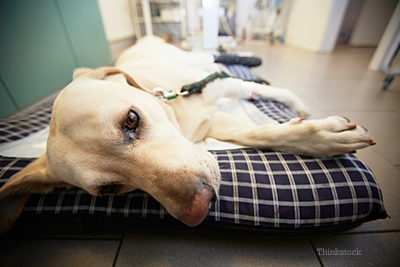
Dr. Phil Zeltzman is a traveling, board-certified surgeon in Allentown, PA. His website is www.DrPhilZeltzman.com. He is the co-author of “Walk a Hound, Lose a Pound” (www.WalkaHound.com).
Kelly Serfas, a Certified Veterinary Technician in Bethlehem, PA, contributed to this article.
If your dog or cat is scheduled for surgery, your veterinarian will likely ask you to take a few steps to prepare. Following these steps will help everything run smoothly on the day of the procedure.
Fasting before anesthesia
Any time your pet is scheduled for anesthesia, fasting will be required. Why is that?
Tranquilizers and anesthesia drugs decrease the swallowing reflex. If your groggy pet vomits from the drugs, there is risk of aspirating, or inhaling, the vomit into the lungs. This can cause a type of pneumonia called aspiration pneumonia, which can be fatal.
Different veterinarians will have different time requirements for withholding food. Sure, your dog or cat may complain about it, but please don’t give in! It truly is for your pet’s own safety.
There are a few exceptions to the fasting rule:
- Puppies and kittens have little energy in reserve, so your veterinarian will likely instruct you to give them a small meal in the morning.
- Pets with diabetes may also need a small meal in the morning, along with insulin, so please discuss this with your family vet.
Most vets will allow your pet to drink water overnight, until you leave home, to prevent dehydration.
Preparing for surgery
Before the procedure, ask your veterinarian if you can give medications in the morning — some may be needed, but some can be skipped. Also ask if you should drop off your pet’s medications or food the day of surgery. It’s always better for your pet to eat his normal food, whether it’s generic food or a special diet.
for your pet to eat his normal food, whether it’s generic food or a special diet.
You may have been told how much confinement your pet will need after surgery, and what that entails; please make sure you have a room, a play pen or a crate prepared for the day your pet comes home.
The morning of surgery
You will need to drop your pet off early in the morning, even though surgery may not occur until late morning or the afternoon. Why is that? There are multiple reasons, depending on your pet’s specific situation. Your veterinarian may wish to:
- Run a physical exam
- Run blood work
- Place an IV catheter
- Administer IV fluids
- Start specific medications
- Take X-rays
- Perform an EKG
- Calculate anesthesia drug doses
This list offers only a few examples; even more may be necessary before surgery is performed.
Your pet’s veterinarian and nurses will have to fill in several documents, regarding the physical exam, the anesthesia plan and the care needed for your pet. In addition, surgery may actually occur earlier than expected if there is a schedule change.
Your veterinary team needs to be as prepared as possible so that your pet is safe and sound during anesthesia and surgery. One last reason for the early drop-off is to ensure that your pet doesn’t get into any food by accident!
What to expect at the clinic
Once you arrive at the hospital, you will likely need to read and sign an estimate and a consent form to make sure everybody is on the same page. It’s important to review them and ask the nurse or the receptionist to explain anything that’s unclear. Don't forget to review:
Make sure you leave a reliable phone number so that you can be reached easily at any time.
Once your pet has been dropped off, it’s time to try and relax by keeping your mind busy!
If you have any questions or concerns, you should always visit or call your veterinarian -- they are your best resource to ensure the health and well-being of your pets.
